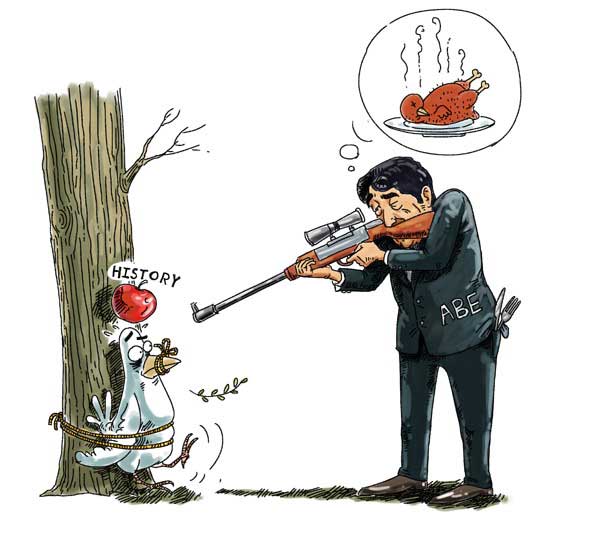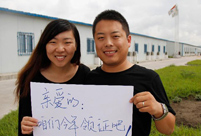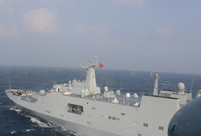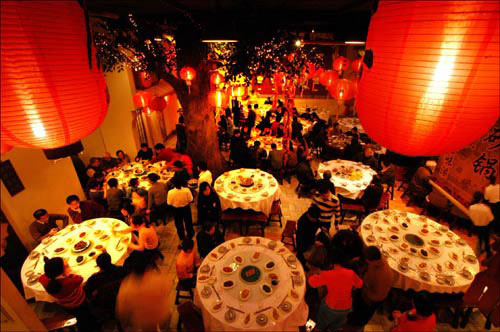 Cockfighting show staged in E. China's Heze during Spring Festival
Cockfighting show staged in E. China's Heze during Spring Festival
 Chinese New Year Flower Fair opens in San Francisco
Chinese New Year Flower Fair opens in San Francisco
 Festivities in Shanghai
Festivities in Shanghai
 PLA navy conducts drill in North China Sea
PLA navy conducts drill in North China Sea
 World's high-tech hotels
World's high-tech hotels
 Li Na poses with trophy on Brighton Beach in Melbourne
Li Na poses with trophy on Brighton Beach in Melbourne
 Six Chinese divers back safely after 300-meter saturation dive
Six Chinese divers back safely after 300-meter saturation dive
 Traditional wedding ceremony of Yao people
Traditional wedding ceremony of Yao people
 Taipei Game Show attracts geeky gamers
Taipei Game Show attracts geeky gamers
 |
| (China Daily) |
Lowering tensions between China and Japan over historical issues and maritime territorial disputes is a common wish. But how can this wish be fulfilled when Japanese politicians are trying to create confusion about history?
Following Japanese Prime Minister Shinzo Abe's condemnable visit to Yasukuni Shrine, which honors 14 Class-A war criminals, on Dec 26, Japanese politicians and officials have passed more comments and taken more actions that have hurt the feelings of people in neighboring countries.
On Feb 3, Naoki Hyakuta, a governor of NHK (Japan Broadcasting Corporation), publicly denied that the Nanjing Massacre, in which 300,000 Chinese civilians and unarmed soldiers were killed by the Japanese, ever took place. His remarks came after his colleague, Katsuto Momii, the new NHK chairman, tried on Jan 25 to whitewash Japan's atrocities in regard to "comfort women" by saying that the Japanese military's use of sex slaves during World War II was a common practice for nations at war. Momii described international anger against Japan for forcing women into sex slavery as "puzzling."
While such outrageous comments are appalling, they should not come as a complete surprise because Hyakuta, a nationalist novelist, and Momii were handpicked by the like-minded right-wing Abe for the NHK posts.
On Feb 4, news reports said Japan planned to submit the last letters of Kamikaze pilots, often written just before they took off on their suicide attack missions during World War II, for entry into UNESCO's Memory of the World.
A day later, eight Japanese organizations issued a letter to US President Barack Obama, urging him to visit Japan and acknowledge that the dropping of atomic bombs on Hiroshima and Nagasaki in August 1945 was a crime against humanity.
Though Abe visits a shrine that honors war criminals in defiance of the international community's demands, he chooses to denigrate Ahn Jung-geun, who fought for Korea's independence during Japanese occupation, as a "convicted murderer". His remarks came after his chief government spokesman Yoshihide Suga labeled Ahn a "terrorist", drawing angry protests from South Korea. Ahn shot dead Hirobumi Ito, Japan's first governor-general of occupied Korea, in Harbin in China's Heilongjiang province on Oct 26, 1909. Ahn was executed by the Japanese at the age of 30. A monument to Ahn unveiled in Harbin last month was welcomed by Koreans but opposed by Japan.
Moreover, Japan has also revised school textbooks and Abe has even tried to deny the atrocities and massacres carried out by the Japanese before and during World War II as constituting "aggression". The list of Japanese politicians' attempts to rewrite history could go on. What is, however, shamefully hypocritical on the part of Japanese politicians is that they have tried to do all these on the pretext of spreading peace and renouncing war.
In sharp contrast, German leaders have owned up to their country's sordid past and never tried to pay homage to the Nazis, deny the Holocaust or submit Nazi war criminals' letters for entry into UNESCO's Memory of the World.
Not for nothing did Amitai Etzioni, a renowned American sociologist who was a child in Germany when the Nazis rose to power in 1933, say that the best thing Japan could do is to send 200 public intellectuals and political leaders to Germany to see what it is like for a country to face its past, come to terms with it, make it part of its schools and army and never let it happen again.
If Abe were sincere about repenting for Japanese atrocities before and during World War II, he should repeat time and again what former Japanese prime minister Tomiichi Murayama said in 1995: Japan "caused tremendous damage and suffering to the people of many countries, particularly to those of Asian nations".
More importantly, as Japan's prime minister, Abe should take measures to clear all the confusion about Japan's military past to ensure that Japanese people do not repeat the shameful deeds of their forefathers. And if he himself is confused, he should use Germany as a mirror to see the real picture.
The author, based in Washington, is deputy editor of China Daily USA.
 Special Coverage: Sochi Winter Olympic Games
Special Coverage: Sochi Winter Olympic Games  A day of a female high-speed train chief attendant
A day of a female high-speed train chief attendant New Year greetings from Chinese nationals in Africa
New Year greetings from Chinese nationals in Africa PLA navy conducts landing drills in South China Sea
PLA navy conducts landing drills in South China Sea  Blind date fair in Hangzhou
Blind date fair in Hangzhou  Highlights of Chinese New Year celebrations around the world
Highlights of Chinese New Year celebrations around the world  How do the Chinese spend their money during Spring Festival?
How do the Chinese spend their money during Spring Festival? 'Milk Tea' girl hosts Spring Festival gala of universities in U.S.
'Milk Tea' girl hosts Spring Festival gala of universities in U.S.  Brave mother fights cancer, enjoys Spring Festival with her triplets
Brave mother fights cancer, enjoys Spring Festival with her triplets President Xi visits border troops ahead of Lunar New Year
President Xi visits border troops ahead of Lunar New Year What do Chinese pack in their luggage in Spring Festival Rush?
What do Chinese pack in their luggage in Spring Festival Rush? Blind date fair in Hangzhou of Zhejiang province
Blind date fair in Hangzhou of Zhejiang province Film 'Where Are We Going, Dad' premiered in Beijing
Film 'Where Are We Going, Dad' premiered in Beijing  Australian Open champion Li Na returns to hometown Wuhan
Australian Open champion Li Na returns to hometown Wuhan Twin sisters serve during Spring Festival travel rush for the first time
Twin sisters serve during Spring Festival travel rush for the first timeDay|Week|Month